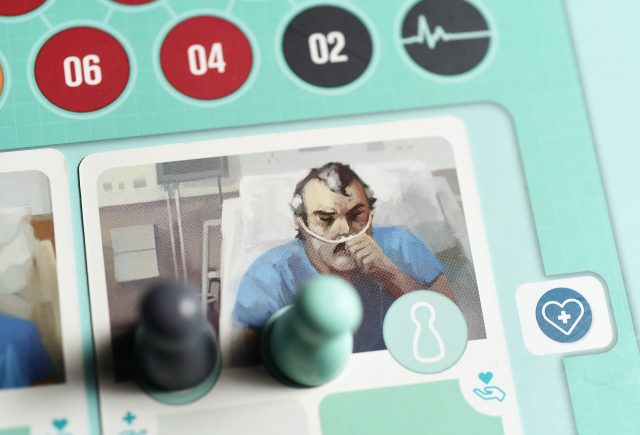I admire those who step into the world of caregiving. It’s rough work emotionally and physically, and I can’t imagine how tough it is to be making interpersonal connections in an environment where sometimes you just.. can’t help. For me, Holding On: The Troubled Life of Billy Kerr seemed like it might be stressful in that regard, but fascinating from a gameplay perspective. Interestingly, most people I’ve chatted to have been hesitant to try due to friends or family who have gone through serious or terminal illnesses – simply put, this hits close to home for them. I’ve approached it from a slightly more removed perspective having not gone through anything quite so drastic, but I still found the game was impactful overall. After trying it at Origins mid-2018, I was chomping at the bit to see where the story and game went from there.

Holding On is a co-operative game, and it’s most certainly one where you really need to be discussing openly, constantly taking stock and planning well with your team. There’s no room for alpha gamers here, and everyone must be dedicated and focused or you will fail. I assume, very similar to what a regular hospital setting must be like, nobody can afford to drop the ball when someone’s life is on the line. Elderly Irishman Billy Kerr comes to your fictional hospital having suffered heart failure on a flight from Sydney to London – he’s not in great shape physically and you need to make sure he’s kept stable and at the same time you’ve got to figure out how to help him out of his haze and piece together his story.
The structure of gameplay is really quite straightforward considering the complexity of the narrative and the difficulty of the scenarios overall. Much of the direction of the game is driven by cards, with players making decisions in reaction to these . Each day you’re with Billy consists of three cards that represent a day’s shift, requiring the nurse team to help with palliative or medical care to make sure Billy’s in good hands and you’re getting information you need to help him (and discover his story). Players will select cards to place their pawns onto, hopefully being able to – as a team – get through the shift without anyone needing to go on stress leave. Care tokens gained throughout the rounds are used to stabilize Billy’s health, and to coax him into chatting about his life. This is where the meat of the story is.

Billy’s past is.. well, troubled! There’s no spoilers in that, considering the game’s title. (And I’m not going to go into details here about his story, more general discussion if you’re worried.) The way that the memories of his past are teased out is possibly my favourite part of the game, as well as the most frustrating. Let’s look at the former, first. When you perform the “palliative care” action during the day’s shift, there’s a couple of things this can mean – you’re either gathering care tokens for the team to help Billy with, or you’re starting to get into his history by him sharing “partial memories” – little hints of his childhood, and as he gets older, relationships and how they grow and fail, all set against the fear and uncertainty of Ireland during the Troubles. Dealt from a deck of cards, memories will come from one of 5 timelines – depending on the scenario, some might be more important to you than others. During your shift you may also have a chance to “inquire” about certain timelines of Billy’s memory, which will then be drawn from the “clear memories” deck – if these match the partial memories in play, you’re onto something!
After the first couple of scenarios you’re able to direct your questioning about memory timelines somewhat, but you’re still somewhat at the mercy of the randomness of the deck and any events that might pop up and thwart your chatting with Billy. This is where the frustration mentioned earlier comes in. Aiming to hit certain timelines with certainty is tough, and you’ve got to hope for the best – especially when a scenario expects you to come to a set of clear memories for particular timelines. And as much as you want to discover the memories and piece together the timelines and story points, you also can’t just focus on that – Billy’s health is important and it’ll become detrimental to him and your crew if you ignore that to plow through the story.

This isn’t to say, of course, that the challenge isn’t worth it. Billy’s life story is narratively incredibly well-done, giving him a very personal experience of a life growing up in a divided Ireland. The choice of Hub Games to give this over to a professional writer was incredibly smart, and the hints of emotion and drama are well seeded throughout the timelines. It’s a strong, fleshed-out story layered into the narrative of your daily shifts in the ward looking after Billy. My experience of playing and really trying to drive through the game meant I started to become a little removed from the meaningful narrative and was increasingly worried about the gameplay itself.
The game overall consists of 10 scenarios – the first couple easing you into the idea of the game’s structure as well as the story of Billy. The game is challenging (to play and to consider as a story/experience) – but it’s not always turned up to 11; you’ll end up having a bit of an easier time than others at certain points, and getting to move onto a new part of the story and find out more about Billy’s past is a great motivation. Revel in that narrative and experience rather than punishing yourself for failure. You won’t always be able to save Billy, nor tease the story you need out of him, but when you harmonize that balance between medical and palliative care and hit the objective of the scenario it’s so worth it.

This game isn’t for everyone. Not every game is, of course. But we’re starting to see co-operative games populate the hobby enough that not all of them have to be equally appetizing to those who enjoy the genre. I’m extremely excited to see such a strong narrative approach to a co-operative game, and I hope there will only be more in time to come. I especially hope that there’ll be other “Holding On” titles from Hub Games, as the team has not just the design chops but the passion for story that makes Holding On: The Troubled Life of Billy Kerr fantastic. Anyone who’s passionate about story and narrative should give this one and enthusiastic try!
—
Holding On: The Troubled Life of Billy Kerr is a co-operative game for 2 – 4 players, with 10 scenarios to play through (each taking approximately 45 minutes). Designed by Michael Fox and Rory O’Connor, art is by Bryn Jones and the game is published by Hub Games. Thank you for the review copy and our chance to get to know Billy!
How dark, serious, and/or disturbing is the story? This sounds like an interesting style of game, but I am concerned about how depressing/disturbing the story ends up being.
murder? cannibalism? child abuse? rape? loss of a child? torture? animal abuse? Is is that dark?